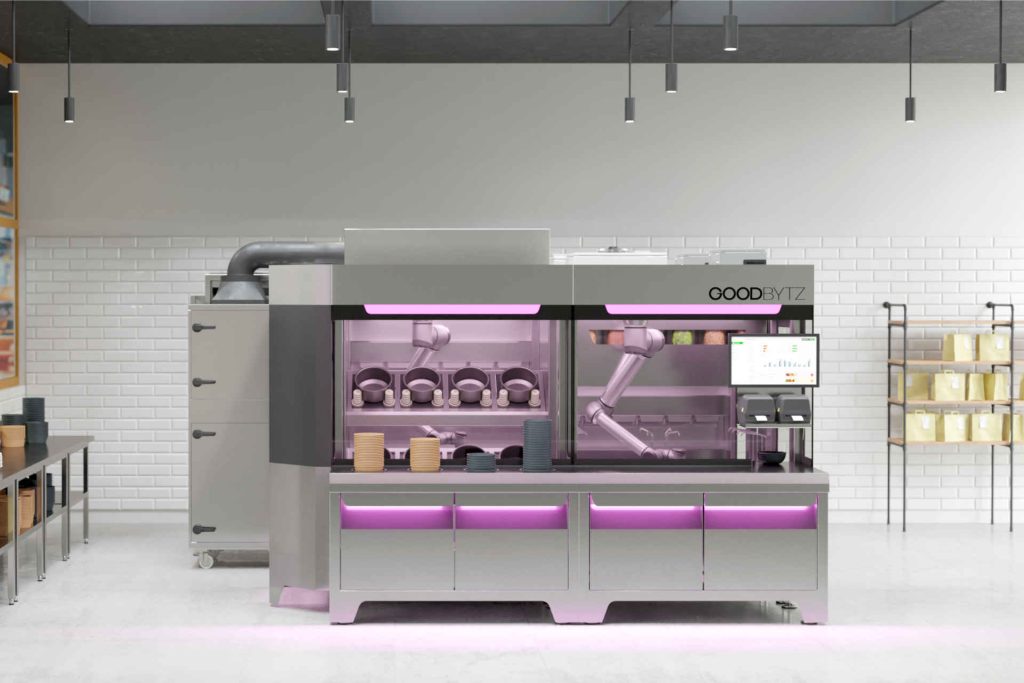
Robotic arms, strong flavors and an operating margin plus 33%: How Germany’s first Ghost Kitchen with a cooking robot is shaking up the industry.
Can a robot have cooking talent? In Frankfurt, the answer is now: yes - and how. With Lady Umami, the F&B Heroes are launching Germany's first fully autonomous Ghost Kitchen. No chef, no brigade - just a specially developed cooking robot that produces dishes precisely, quickly and with consistent quality. This is made possible by a combination of robotics, a smart concept and the courage to innovate.
The concept is far more than just a PR stunt. It is a serious step towards the future of system catering - scalable, efficient and with up to 33% higher margins than the industry average. The smart cooking arm was developed together with technology partner GoodBytz, while the menu was implemented by the F&B Heroes concept developers themselves. The initial results: top ratings on the Wolt delivery platform (9.4/10 points) and a remarkably high reorder rate.
"Fully autonomous kitchens have become a reality. With Lady Umami, we have created a concept that combines quality, scalability and cost-effectiveness," says Tim Plasse, Managing Director of F&B Heroes.
The “ghost kitchen” concept - kitchens without a dining room that operate exclusively on delivery platforms such as Wolt, Uber Eats or Deliveroo - has developed massively in recent years. According to Statista, global sales in the online food delivery sector will exceed 1.6 trillion US dollars by 2027. By 2030, ghost kitchens could account for 50% of the global market share in the takeaway and drive-thru sectors. What was once considered a pandemic emergency solution is now a business model with prospects - and Lady Umami is an ambitious example of where the journey can take us.
The F&B Heroes are already thinking ahead: the new dining club concept LIV - a hybrid model of robot kitchen and community-driven self-service - will be launched in Düsseldorf in 2025. LIV will not only be a restaurant, but also a test laboratory for future club formats - including the possibility of multiple scaling in urban centers.
A new option is opening up for operators and investors: ghost kitchens like Lady Umami function independently of staff shortages, space constraints or classic peak challenges - and still offer creative quality. The potential for hotels that dock external kitchen models or for restaurateurs who want to expand with little risk is enormous.
And so is the demand. What is needed now is courage and concepts like this that show how robotic dining is not just science fiction - but is becoming reality.

There is a tension between digital progress and emotional hospitality that is redefining the restaurant industry. AI, automation, and data-based processes are changing not only workflows, but also attitudes, communication, and expectations. What was once considered a gimmick is now becoming a strategic necessity. And perhaps the most important question of our time: How can humans remain relevant in a world that is becoming increasingly digital?
The Austrian brand Kumanu shows how circular thinking can be applied in everyday life—and makes doing without plastic both practical and aesthetic. With its “Frischefritz” beeswax wraps and ‘Krümelkarl’ and “Pausenpaul” bread and snack bags, it provides the industry with a well-thought-out solution for keeping food fresh for longer – without any plastic or aluminum foil.
The products are made from GOTS-certified organic cotton, organic beeswax from Austria and Germany, and tree resin from traditional pitch production – a combination that has an antibacterial effect and guarantees natural durability.
Leonardo Hotels is expanding its commitment and turning World Cleanup Day 2025 into a European movement: Employees from 140 hotels in 12 countries are participating in cleanup campaigns – from Berlin to Bucharest, from London to Rome. Instead of a single day, the period has been extended to ten days to allow as many teams as possible to participate.


Robotic arms, strong flavors and an operating margin plus 33%: How Germany’s first Ghost Kitchen with a cooking robot is shaking up the industry.